
Since its inception in 2020, Notre Dame Law School’s Religious Liberty Initiative has worked globally to promote and defend freedom of religion or belief for all people, regardless of their faith background. Each year, the initiative hosts the Notre Dame Religious Liberty Summit, bringing together expert global scholars, advocates, government officials, and faith leaders for robust discussions on complex global religious liberty issues and the future of religious freedom on the worldwide stage.
This year the fourth annual Notre Dame Religious Liberty Summit featured nearly 50 speakers in 16 panel discussions on topics such as using international diplomacy to decrease religious polarization, the need for solidarity among persecuted religious groups, and the state of religious freedom in Ukraine amid invasion and war.
Over 175 leading scholars, faith leaders, and advocates from more than 10 countries gathered on the University of Notre Dame campus to discuss the theme of the summit, “Depolarizing Religious Liberty."
Professor Stephanie Barclay, faculty director of Notre Dame Law School’s Religious Liberty Initiative, introduced the theme in her welcome remarks.
“As we see a rise in people who aren't attending church, we have a lost opportunity where people can sit on a pew with someone that they disagree with, who sees the world differently, who they can learn from, and be able to hear a perspective where we may have disagreements, but I believe that you're a good person, that you care about this country, and I have something to learn from you,” said Barclay regarding the polarized global religious and political climate. “The very fact of having those conversations themselves is important.”
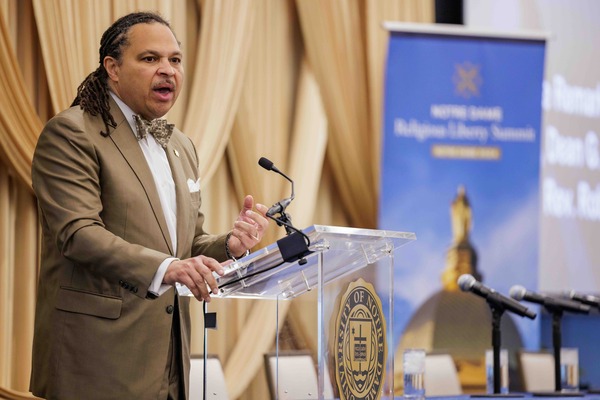
In his opening remarks, Dean G. Marcus Cole, founder of Notre Dame Law School’s Religious Liberty Initiative, spoke of the importance of standing in solidarity with all people facing religious liberty violations.
"The challenge for those of us who know the importance of religious freedom is to take religious liberty out of politics. For religious liberty to flourish, it cannot be an issue of the right or the left. It cannot be the property of conservatives or liberals. It cannot be valued by some and derided by others. It cannot be wielded as a tool of oppression or exiled as an object of hate,” said Dean Cole. “For religious freedom to flourish, and for humans to flourish as a result, we must depoliticize it. We must recapture the true meaning of religious liberty and reclaim it from those who would use it for political purposes. We must champion religious liberty for all people, of all faiths, and especially those who have no faith at all."
Panelists and keynote speakers throughout the Summit especially focused on the ways in which the current domestic and international political climates impact religious liberty and the polarization thereof, and the measures that can and should be taken by governing bodies to ensure all people have the right to freedom of religion or belief.
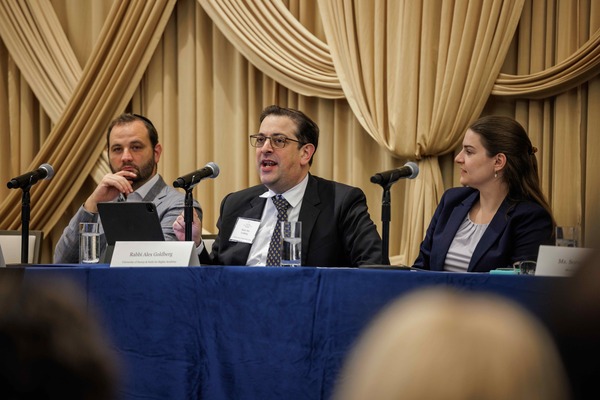
In the first panel, “Muslim and Jewish Voices Finding Common Ground After October 7th,” Rabbi Alex Goldberg, an internationally-recognized advocate and activist against religious and racial discrimination, spoke on the importance of depolarizing religious liberty between two faith groups who have both experienced significant pain and loss since October 7, 2023.
“To foster lasting good community relations and mutual understanding between Muslim and Jewish communities and to provide a stable future for both in Europe and North America, we must develop a new concept of Bilateral Strategic Dialogue, making regular interactions between our communities habitual, purpose-driven, and inclusive to a broader circle of participants,” said Goldberg. “This will require civil society, faith actors, government, and intergovernmental organizations to work together in a world where rising nativist and populist movements seek to halt progress.”
Goldberg was joined by fellow panelist Soraya Deen, the founder of Muslim Women Speakers, who also spoke about the need for community and people-first solutions to the religious polarization facing Jewish and Muslim communities across the globe.
“For those of us feeling a compelling need to work together to find common ground after October 7, know that you represent a high moral value. We must now lay the foundations for intellectual curiosity, courage, and compassion,” said Deen. “The conflict might never be about land. It is always about people.”
In a keynote address and accompanying panel, Professor John Inazu at Washington University in St. Louis, highlighted his book, “Learning to Disagree: The Surprising Path to Navigating Differences with Empathy and Respect,” which offers a roadmap for finding compassion, respect, and common ground in the face of conflicting opinions and beliefs.
"If there is an antidote to our growing animosity, a way to disagree better, I think it lies in actions that are at the same time simple and extraordinary, and increasingly countercultural: forgiveness, admitting wrong, tolerating disagreement, listening patiently,” said Inazu. “The problem is that none of these actions happen naturally or quickly. You have to work at them.”
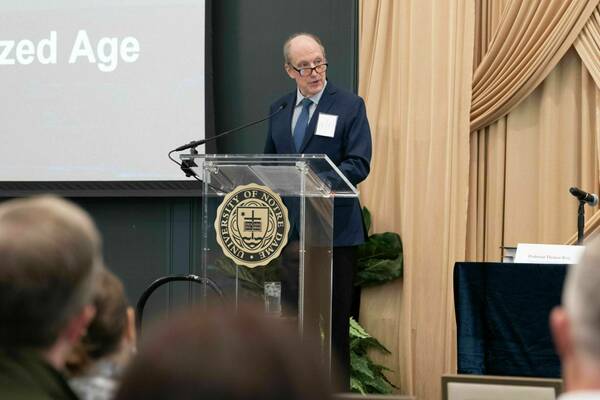
The summit’s second day of academic programming featured a discussion on “Religious Liberty in a Polarized Age,” led by Professor Thomas C. Berg.
Panelists discussed the intersection of legal theory and social science as it relates to religious depolarization, and the ways in which strong yet fair legislative measures can be taken to protect religious liberty.
“Protection of religious liberty can reduce suffering and mitigate polarization — if the protection has three features: First, it must be strong — allowing people ample room not just to believe, but to live out their beliefs without fear of penalty. Second, it must extend to all religious views; it can’t support only the groups with which you sympathize, whether that’s conservative Christians or classic religious minorities (with whom progressives sympathize). Third, religious liberty must have boundaries that take account of other important interests,” said Berg. “With careful analysis, I argue, we can have strong religious freedom with proper boundaries.”
Legislative and geopolitical climates and the impact they have on religious liberty were further highlighted by a subsequent panel, “The State of Religious Freedom in Ukraine: Then and Now.”
“Ukraine is a country with a high level of religious freedom and maintains internal religious peace. The existence of an independent, sovereign, democratic Ukraine is a guarantee of observance of the right to freedom of religion,” said Metropolitan Yevstratiy Zoria, panelist and religious official of the Orthodox Church of Ukraine. “Within free territories, freedom of religion is a reality protected by law. Freedom of religion does not exist in the territories occupied by Russia.”
“For the United States of America, advancing and protecting religious liberty around the world is now a national security imperative,” added Samah Norquist, fellow panelist and former Chief Advisor for International Religious Freedom to the Administrator of the U.S. Agency for International Development (USAID). “Nations can prosper only when they have pluralistic societies where the freedom of conscience of its citizens is protected, and its citizens are allowed to be free and equal.”
The Summit’s culminating event was the Religious Liberty Gala and Awards Dinner held on Wednesday, July 10.
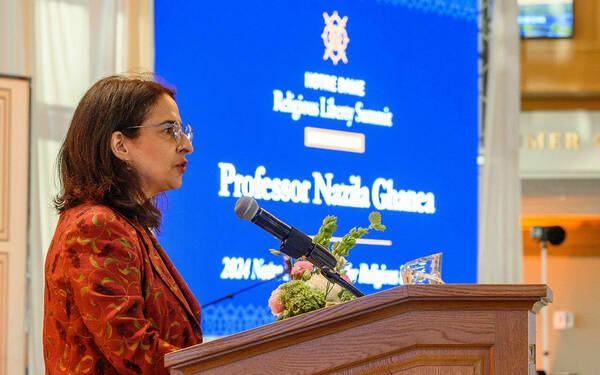
During the gala, the 2024 Notre Dame Prize for Religious Liberty was presented to Nazila Ghanea, UN Special Rapporteur on Freedom of Religion or Belief and Director of International Human Rights Law Programmes at the University of Oxford.
“This summit provides such a wonderful opportunity for those who cherish freedom of religion or belief for all, for all who seek to advance it both at home and around the world. We can share experiences, consider challenges, regain strength, and seek the opportunities together,” said Ghanea. “By seeking to advance this freedom for others, we too are enriched. Our understanding of what others hold dearly as matters of conscience grow; our efforts to appreciate that diversity expand our horizons and our empathy. As we consult those who are impacted and seek to support them, we learn together how to uphold respect for everyone in the process.”
In her acceptance remarks, Ghanea shared stories of her childhood that highlighted the religious persecution her family faced in their home country of Iran and then again in their new home of Qatar 25 years later.
“As a child, my maternal grandfather was forcibly separated from his father until they were reunited in another city in Iran, 300 miles away from his hometown. His great grandfather was pursued and beaten up for being Baha’i with tremendous regularity. Harassment, displacement, and persecution were so regular that they were just normalized for generations,” said Ghanea in her remarks. “Religious restrictions followed our family around through generations and two countries. Even the whole family history fades in the world of grievous violations of freedom of religion or belief.”
The 2024 Religious Liberty Initiative Scholarship Award was presented to Thomas C. Berg, the James L. Oberstar Professor of Law and Public Policy at the University of St. Thomas School of Law.
“For religious freedom to remain vital, we must make it strong for all faiths, and also think carefully about the boundaries of religious freedom that do need to take into account other important interests while still protecting religious liberty, and that's where intellectual work and careful thinking comes in,” said Berg. “The long-term health of religious liberty requires defending it with arguments that can cross ideological lines, that can persuade people who are not already predisposed to accepting religious liberty or the particular claim in question.”
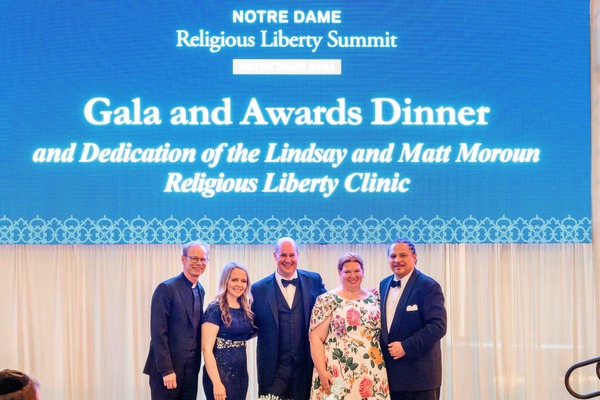
The gala also featured a special dedication to the Moroun family, whose transformational gift led to the establishment of the Notre Dame Religious Liberty Clinic in 2020. In recognition of their generous contribution, it was announced at the gala that the Notre Dame Religious Liberty Clinic will now be known as the Lindsay and Matt Moroun Religious Liberty Clinic.
“We are blessed and honored to be a part of the Law School's Clinic as it leverages the talents and zeal of its leaders and law students to protect this foundational freedom. We are further encouraged by the attendees and distinguished guests of this conference in the seriousness of their concern for this sacred freedom,” said Matt Moroun on behalf of the couple. “It is Lindsay's privilege and my privilege to financially support this counterattack so boldly and courageously undertaken by Dean Cole and Fr. Dowd.”
The Summit also included a number of cultural experiences for attendees, including tours of the Basilica of the Sacred Heart, a lunch featuring traditional Uyghur cuisine and performance by the Miras Silk Road Collective and Tara Catherine Pandeya, and the opportunity to visit the Raclin Murphy Museum of Art on Notre Dame’s campus.
“We here at Notre Dame are inspired by our Catholic faith, to support religious liberty and to promote greater respect for religious liberty across the world. We know that this is the key to human flourishing. And so we are going to be more dedicated to this than ever,” said University President Fr. Robert Dowd, C.S.C. “My hope and prayer is that the seeds planted during these conversations will truly bear fruit in the weeks, the months, and the years to come as we work together to be a force for good — a force for human liberty, religious liberty, and human flourishing.”
More stories and news about the 2024 Notre Dame Religious Liberty Summit:
- Notre Dame Law School Religious Liberty Clinic to be named the Lindsay and Matt Moroun Religious Liberty Clinic
- ND Law’s Religious Liberty Initiative presents 2024 Notre Dame Prize for Religious Liberty to Nazila Ghanea
- 2024 Notre Dame Religious Liberty Summit hosts Gala and Awards Dinner and Dedication of the Lindsay and Matt Moroun Religious Liberty Clinic
- 2024 Notre Dame Religious Liberty Summit: Dean G. Marcus Cole’s remarks at Gala & Award Dinner
- 2024 Notre Dame Religious Liberty Summit: Dean G. Marcus Cole’s welcome remarks
- ND Law to hold fourth annual Notre Dame Religious Liberty Summit at the University of Notre Dame
Originally published by at law.nd.edu on July 22, 2024.